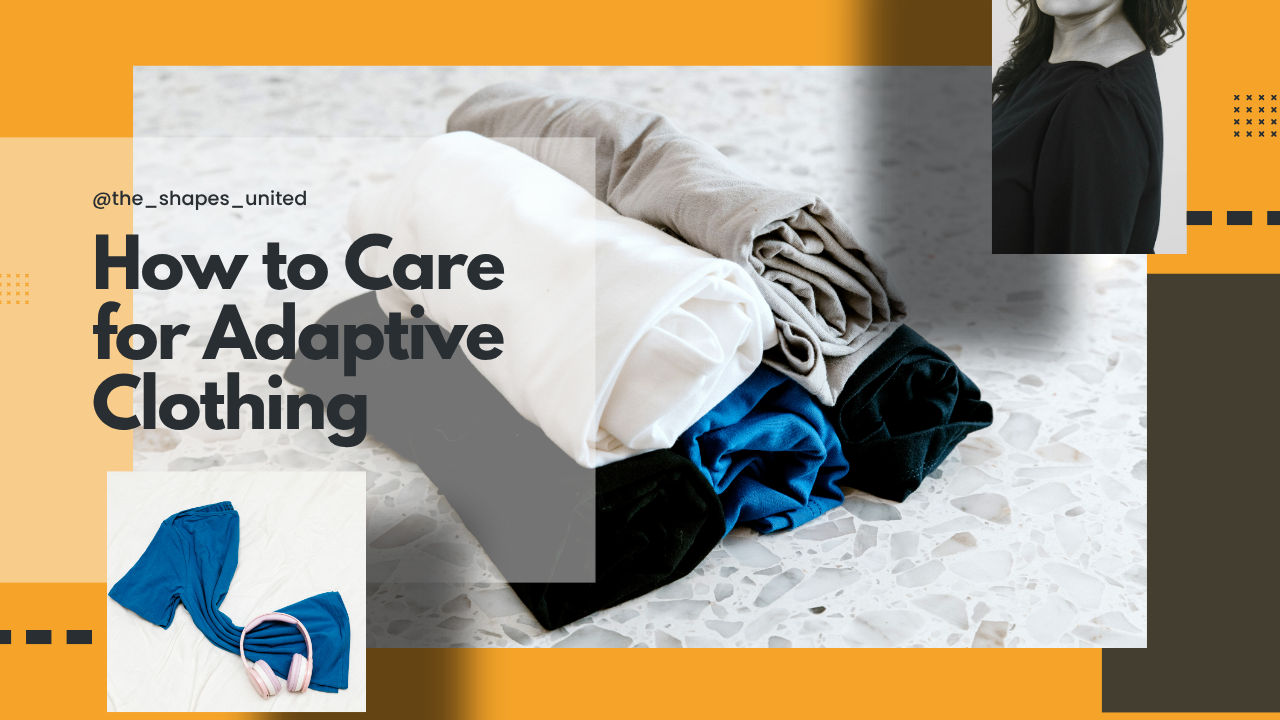|
By Miranieva Buen |
How to care for adaptive clothing is a rising question more and more people ask.
Witnessing this category becoming prevalent, especially with people understanding that this specialised clothing is made for disabled people, people with limited mobility and dexterity, people with sensory issues, and the elderly.
However, adaptive clothing comes in different textures, specifically materials.
For example, our bestselling Bamboo Cushion Sole Seamless Comfort Sock has a 100% yarn exterior and a 90% bamboo and 10% spandex interior.
You may think chucking it in the washer and it'll sort itself out will work, but taking care of adaptive clothing is imperative to prolong its life and usage. When caring for adaptive clothing, delicate materials like nylon and elastin need special consideration. Strong essential oils like eucalyptus should be avoided or used cautiously in diluted forms.
Here are a few of our bestsellers to explain:
How to take care of Adaptive Clothing
The Shapes United bestselling high-waisted pencil skirt is both adaptive and sensory.

It is designed to be easy to wear, with no elastic waistband, flat seams, or tags. Handwashing and machine washing are both possible to keep it clean.
If you're going the handwashing route and want to make adaptive clothing last longer; gently is the key!
Use lukewarm water and a mild detergent. Submerge the garment, gently agitate, and rinse thoroughly. The key to longevity is to avoid wringing or twisting, which will damage the fibres.
A gentle or delicate cycle is preferred for machine washing, and cold water is used to prevent shrinkage and colour fading.
Use a mild detergent that is FREE of bleach and harsh chemicals. To protect it further, place the skirt in a mesh laundry bag to protect it from friction and stretching.
You may want to iron the pencil skirt, but please use a low-heat setting. To protect it further:
-
Place a pressing cloth between the iron and the garment to avoid direct contact.
-
For storage, fold the garment and avoid putting it in overcrowded storage areas.
-
AVOID hanging the pencil skirt for long periods, as it can cause stretching.
Here's an interesting fact you must know:
Avoid direct sunlight when drying. Prolonged sun exposure may weaken the fabric and cause fading. 
Comfy T-shirt
This product is made of 100% breathable, soft-touch organic cotton jersey, made to be sensory friendly.
The great news is that it's machine washable, BUT there are still some precautions to take when handling it.
That is, DON'T USE Fabric Softener. While fabric softeners are great for normal clothing, they affect special materials by leaving residue that reduces the garment's softness. These residues can also affect the clothing's fiber.
After washing, the Comfy T-shirt must be air-dried.
Tumble drying is a no-no. Remember, patience is key. High heat can lead to shrinkage and damage to the organic fibers, which, in turn, can affect the shirt's sensory qualities.
So, take your time and let it air dry naturally.
Here's where it gets tricky.
Women's Standard Buttons Underwear
The Women's Standard Buttons Underwear is equipped with advanced "clip-knix" technology, a cleverly designed underwear solution to allow the wearer to put these on in a standing, sitting, or lying position.
The standard bikini style has front-positioned openings with clip and hook fastenings, which increases the independence of women who wear them. This amazing underwear is made of 90% cotton, 5% elastane, and 5% polyamide, sourced ethically.
The Women's Standard Buttons Underwear, with its clip-knix feature, is machine washable. However, it does require special care to maintain its functionality and durability.
First, the underwear must be washed with cold water to protect its elastic and sensory features. A mesh laundry bag helps protect the clips and fabric from damage during the wash cycle.
Air drying is preferred over high heat. Tumble drying is not a good option, as the high heat may damage the fabric and its clips, causing shrinkage and loss of elasticity.
Now, to the exciting part:
The Unisex Bamboo Cushion Sole Seamless Comfort Sock
Brought to life with a partnership with SOX by Angus, it is perhaps the most comfortable pair you'll ever wear and comes in vibrant colors.
The exterior of these socks is made of 100% yarn, while the inside is made of a unique combination of 90% bamboo and 10% spandex. Hand washing or machine washing are both possible, but it's imperative to avoid wringing or twisting these.
Another important fact is to check if you have hard water. Hard water is rich in minerals and can stiffen bamboo fabric.
To avoid this, use a water softener or add a small amount of white vinegar to your rise cycle.
Also, prolonged exposure to direct sunlight weakens bamboo fibers, so dry your socks in a shaded area or indoors.
If your wardrobe includes adaptive clothing, here are some helpful tips for keeping it functioning for a long time.
Invest in a Mesh Laundry Bag
A mesh laundry bag helps prevent delicate, sensory fabrics from being damaged through a rough washing machine motion, reducing friction and lessening the chances of the clothing getting snagged, stretched, or torn.
Straps, hooks, and velcros may get tangled in the wash, so having a mesh bag to keep them contained can lessen the risk of these clip-knix features shrinking and tangling, ensuring they remain intact and functional.
Mesh bags also reduce the strain of adaptive garments from being exposed to high agitation, helping them maintain elasticity and fit.
It also protects garments from color-bleeding, saving you the hassle of an accidental tie dye.
Ensure Proper Storage
- Fold clothes neatly to avoid creases and maintain their shape/integrity.
- Avoid overcrowding adaptive articles of clothing in closets or drawers, and ensure that the space you store them in allows air circulation.
- Adaptive clothing with clip-knix and Velcro should be stored separately to avoid catching on to other items.
When Ironing
- When the clothing must be ironed, always choose a low-heat setting.
- This is especially true for adaptive clothing, especially those with mixed fibers or special fastenings.
- Always avoid direct contact with magnets or Velcro. Place a cloth between the iron and the garment to avoid potential damage and direct contact.
Always Read the Care Label
- Always read the care label included in the adaptive clothing package.
- The care label provides a specific and appropriate washing method to ensure safe cleaning.
-
The care label also includes special instructions to protect special features to prolong the longevity of your adaptive clothing and prevent fabric damage.
Summing Up
We hope this blog would have helped you answering your question of how to care for adaptive clothing, given how vital it is.
Regular cleaning prevents allergies and irritations, and proper care reduces the frequency of needing to purchase new clothing, making it cost-effective.
Adaptive clothing is an investment to further protect one's autonomy and dignity.
By prioritising the maintenance of such clothing, wearers can enjoy the full advantages of these thoughtfully designed garments, enhancing daily living and overall well-being.






